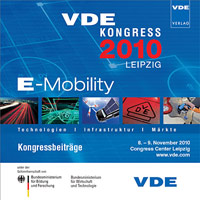Optimal DC-Voltage-Control With a Traction Power Supply DC/DC Converter for Electric Vehicles
Conference: VDE-Kongress 2010 - E-Mobility: Technologien - Infrastruktur - Märkte
11/08/2010 - 11/09/2010 at Leipzig, Deutschland
Proceedings: VDE-Kongress 2010
Pages: 8Language: englishTyp: PDF
Personal VDE Members are entitled to a 10% discount on this title
Authors:
Heinrich, Rico; Cebulski, Bernd (IAV GmbH, Chemnitz, Germany)
Abstract:
The traditional method for PMSM control over a wide speed range is the flux weakening operation in high speed region. This leads to increasing copper losses and decreasing motor torque. To overcome this problem a higher DC link voltage is necessary. In the field of electric vehicles (EV) and hybrid electric vehicles (HEV) the normal battery voltage of LiIon or NiMH is about 150 V up to 400 V . A high voltage boost converter could raise up the DC link voltage to a higher level. This paper illustrates the effects for a higher DC link voltage by using the same motor design. The differences in copper losses for the motor and the total system losses are matched together. Also decribed is a method for optimal torque and current ratio. The maximum torque per ampere method shows the optimale current trajectory by increasing rotor speed.


